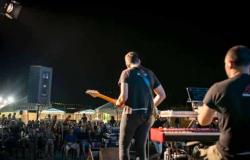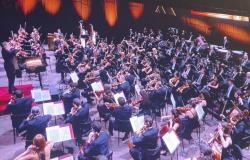A meeting open to all citizens to learn about and contribute to new participatory initiatives in the city: this afternoon, at the Oltre Lab in Piazzale Bertozzi, the mayor Michele Guerra, the councilor for Participation, Associationism and Neighborhoods of the Municipality of Parma Daria Jacopozzi and Giulia Bertone, for the Pares Cooperative, presented the new Regulation of Participation Instruments and Institutions to the many citizens present, explaining the innovations and functions of the ParmaPartecipa platform, https://parmapartecipa.comune.parma.it, created with the collaboration of the Pares Cooperative, and examining the characteristics of the new Neighborhood Laboratories.
During the meeting, a certificate was awarded to the Coordinators of the Volunteer Citizens’ Councils, participatory bodies of the Municipality of Parma which are making way for the new neighborhood laboratories, in recognition of the delicate and demanding work carried out in the five years of activity. “
The mayor, Michele Guerra, remarked: “ParmaPartecipa’s objective is to bring together an ever-increasing number of people around these laboratories. Participation is suffering not only in our city but, in general, in our country and in Europe. Citizens are disheartened about the real impact on political decisions. With this path we intend to bring people closer to politics in a symbolic place like Oltre Lab, a lively place, reopened to citizens in a significant neighborhood like Oltretorrente. I am pleased to see the presence of so many people because it means starting off on the right foot. We will have several opportunities to ensure that these laboratories are truly a place for aggregation, discussion and dialogue on strategic issues for the city”.
The analyzes and reflections made in recent months – declared the Councilor for Participation, Associationism and Neighborhoods, Daria Jacopozzi – have led us to make clear and courageous choices in the field of the culture of participation: the tool of the communicative and interactive platform leads to the development of a European participatory style in Parma too, already present in other countries and cities such as Barcelona, Berlin, Milan, Bologna and the European Community itself. ParmaPartecipa will allow active citizens who sign up to the Neighborhood Workshops, as well as to the Associations, to be visible in the area and therefore to attract new people and ideas aimed at improving the life of the neighborhoods, in a new vitality. We are already observing how spontaneous groups have been activated in some neighborhoods, also around the CCVs, in the logic of “building community” and finding spaces for citizenship by seeking an active dialogue with the Administration. The new laboratories will be places structured and oriented towards shared and generative planning, places open to exchange between citizens and associations, schools, parishes to build and safeguard common goods. Let’s think about the ecological transition with all its challenges, the solitudes to be filled with relationships, the interculturality to be enhanced and brought out. In addition to the neighborhood workshops, it will be possible for all sectors of the administration to consistently use the participatory process as a participatory planning tool. It seems to me that this addresses one of the greatest challenges of our democracy: rebuilding proximity and trust between citizens and elected administrators. For our part, we have created a group of technicians within the Sectors capable of finally responding in appropriate times and ways to the proposals that will arrive from the city’s territories. Mutual listening, visibility and collaboration will be the hallmark of the new participatory system that we presented this evening. We know perfectly well that participation will develop only if the voice of citizens is responded to, even a negative but motivated and reasonable response must be given immediately and openly. We are aware that only in this way can an administration be credible and responsible. It is an important political challenge to be built over time and with patience, we will do our best.”
The new “Regulation of Participation Tools and Institutes” of the Municipality of Parma, recently approved by the City Council, focuses on the theme of participatory democracy, with the aim of promoting collaboration between the Administration and citizens, encouraging the active involvement of citizens and citizens to contribute, through their commitment and skills, to improving the life of the entire community.
All this also thanks to the establishment of neighborhood laboratories, spaces for meeting and discussion, for the development of shared proposals, but also places of birth and development of participatory processes, and of collaboration agreements, through which it is possible to effectively respond to the needs expressed by the inhabitants of the neighborhoods, with the possibility for citizens to consult the activity carried out and interact, in a simple and transparent way, through the new dedicated digital platform, Parma Partecipa.
Through the Regulation and the creation of new Participation Institutes, the bond of trust between the Administration and the city community has been strengthened, creativity is stimulated and the experimentation of innovative practices is made possible, with the result of increasing well-being and improving the quality of life of each individual.
Furthermore, through the diffusion of the culture of participation and the valorisation of all forms of civic commitment and active citizenship, social cohesion is promoted, democracy and its institutions are strengthened, social and institutional innovation is promoted, favoring the entry in participatory institutes, in particular for young people and city users.
The news and key points of the Regulation
Neighborhood workshops
The regulation introduces new neighborhood laboratories, spaces for information, consultation, participatory planning and collaboration, within which needs are collected, priorities are identified, indications and proposals for the neighborhood emerge, and the creation of shared solutions is encouraged and collaborations are promoted. There will be 11 neighborhood workshops with the merger of the San Leonardo-Cortile San Martino and San Lazzaro-Ljubljana neighborhoods. Updating the many years of experience of the Volunteer Citizens’ Councils, the neighborhood workshops involve citizens aged 16 and over, who will have to register in a specific public register. Registrations to participate in the neighborhood workshops will be open starting approximately from the second half of July, following the entry into force of the regulation.
Third sector bodies, schools and other entities interested in promoting the progressive and constant improvement of the neighborhood are permanently invited, with a view to sustainable development, the common good and the care of human relations.
The neighborhood workshops will become a reference space for the inhabitants of the neighborhoods who will be able to find a space for dialogue with the Municipality with a view to a constructive relationship and mutual listening.
Parma Participate
The Regulation gives citizens the opportunity to exercise the right to participate also in digital mode. The new ParmaPartecipa platform has already been active for a few days (https://parmapartecipa.comune.parma.it), which will be used both to inform citizens about ongoing participation initiatives and for consultation on strategic choices for the city, and for the active involvement in the formulation of proposals, starting from the new neighborhood workshops.
Subsidiarity principle
With the new regulation the Municipality intends to encourage the application of the constitutional principle of subsidiarity, making available a range of tools and institutes, which allow citizens to be actively involved, in terms of information, consultation, co -decision or participatory planning, in the definition and development of city public policies.
Objectives of the regulation
The new regulation aims to improve the democratic quality in the creation phase of public policies, to promote social and institutional innovation and increase social cohesion, favoring active citizenship and the participation of citizens, single or associated, in decision making.
Participation, transparency and accessibility
The regulation introduces some innovations, to comply with regional and European indications on participation, which invite the preparation of clear, transparent, accessible and inclusive participation mechanisms to ensure that decisions are taken in the most open and close to all citizens.
Young people and city users
Precisely to meet the demands for inclusiveness, the new regulation provides for the opening of many participation institutions also to minors and non-residents who live in the city of Parma for work or study reasons.
Participatory process
The regulation precisely describes the participatory process as “a structured path of dialogue and discussion which has as its object a decision, or a rule or a project within the competence of the Municipality of Parma in view of its definition”, according to the provisions of the “Law on participation to the development of public policies of the Emilia-Romagna Region (LR no. 15/2028).
Each participatory process activated by the Municipality will be accompanied by a “Participation Agreement” with indicated objectives, methods of carrying out the process, and clear commitments of the Administration with respect to the outcomes.
Participatory budgeting
The regulation precisely describes the methods of carrying out the participatory budget, the institution that involves citizens in choosing how to use a part of the resources of the municipal budget, enhancing their knowledge and skills. Through the participatory budget, proposals can be financed based on current account expenses (environmental education interventions, cultural promotion, event organization) and capital account expenses (extraordinary maintenance, redevelopment of spaces, urban regeneration interventions).





